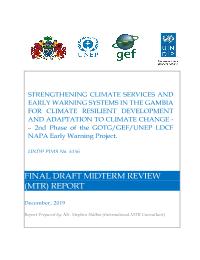
Strengthening climate service and early warning systems in The Gambia
Output 1.4. Scaled up action on climate change adaptation and mitigation across sectors which is funded and implemented
Goal 12. Ensure sustainable consumption and production patterns
Goal 13. Take urgent action to combat climate change and its impacts
12.4 By 2020, achieve the environmentally sound management of chemicals and all wastes throughout their life cycle, in accordance with agreed international frameworks, and significantly reduce their release to air, water and soil in order to minimize their adverse impacts on human health and the environment
13.1 Strengthen resilience and adaptive capacity to climate-related hazards and natural disasters in all countries
1: Environment & Sustainable Development
2: Others


